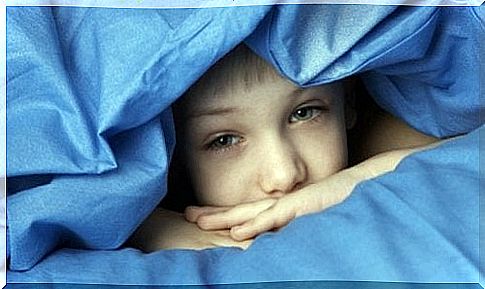Consequences Of Lack Of Sleep In Children – Being Parents

It is believed that only adults suffer from sleep disturbances. However, this also applies to children. In the following article, we will tell you about the consequences of a lack of sleep in children in relation to their growth and their emotions.
Lack of sleep in children
Although it seems hard to believe, about a quarter of children have trouble sleeping. Indeed, this is one of the main reasons for consultations with the pediatrician.
Often, these disorders are linked to poor family habits and lack of boundaries. Parents also go to bed late and are not strict about using screens before going to bed.
Insomnia is harmful at any age, but more so in the case of children. If they don’t sleep well, their body clocks are out of balance. Therefore, they cannot grow or develop properly.
Already before birth, humans have specific brain neurons whose job is to regulate the hours of sleep and wakefulness. They are linked to the body clock and are responsible in babies, for example, to make them sleep more during the first weeks of life.
Of course, this is not just a biological question. It also depends on some external conditions. For example, the brightness or darkness in the bedroom will help in more restful sleep.
When the atmosphere is bright, the brain induces that it is time to wake up. So he cannot get to sleep.
How long should my child sleep based on their age?
Newborns sleep about 16 hours a day. Over several periods of up to four hours maximum. From three months, the duration of nocturnal awakenings decreases. They gradually sleep more continuously.
At the age of two, the little ones sleep about 10 hours. Therefore, at five years of age their sleep cycle is mature enough not to wake up during the night. Likewise, they also don’t need a midday nap.
In adolescence, we often notice that our young people sleep more. This is due to hormonal changes that interfere with the life cycle. On average, they need eight hours of sleep at a stretch every night.

“Almost a quarter of children have problems sleeping. Indeed, this is one of the main reasons for consultations with the pediatrician ”
The consequences of lack of sleep in children
If children don’t get enough sleep every day, some symptoms will appear soon. Some will be more visible or noticeable than others. That is why, as parents, we must be very careful:
- Irritability: bad mood, crying or screaming sometimes for no reason.
- Agitation: hyperactivity.
- Discouragement or weakness: the child does not want to play or go to the park.
- Memory problems: he does not remember basic things.
- Demotivation or lack of courage: he does not express joy for the activities that he liked before.
- Lower academic performance: poor grades, comprehension problems, memory impairment.
- Headache: This problem can appear at different times of the day and affect daily life.
- Minor accidents: the child bumps into what is in his way because of the decrease in his reflexes.
- Increased susceptibility to disease: Lack of sleep weakens the immune system.
- Slow growth: if it is not sleeping, the body cannot get stronger.
How do you get the child to sleep well?
It is essential that our children have a sleep routine. And that the adults follow her too. Remember that example is the best way to learn.
As a first step, bedtime must be established, without exception including weekends. The same goes for the time of getting up. Allowing them to “sleep later” on Saturdays and Sundays is counterproductive to their health.

In addition, it is recommended that the afternoon naps are not too long – maximum one hour -. And that they end before 4 p.m. In this way, there will be no interference with the nighttime sleep cycle.
In addition, diet also plays a role in our sleep. Dinner should be light and contain a majority of vegetables. Fried foods, sugars and flour slow down digestion and make sleep heavier.
Finally, it is necessary to avoid screens and electronic devices before going to bed. The light emitted by these devices puts the brain on high alert. It is best to read a paper book or play with dolls quietly.
Thanks to all these tips, lack of sleep in children will be a bad memory.









